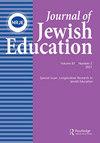The Philosophies of Israel Education
IF 0.4
Q4 EDUCATION & EDUCATIONAL RESEARCH
引用次数: 0
Abstract
This issue of the Journal of Jewish Education is devoted to a conversation about the philosophies that do, and might, undergird the scholarship and practices of Israel education. Readers will find in its pages disagreements about Israel, the role it does and ought to play in Diaspora Jewish life, and how educators ought (and ought not) frame educational experiences relating to Israel for Diaspora Jewish learners. The conversation is anchored around a lede article, “Israel Education: A Philosophical Analysis,” co-authored by Benji Davis and Hanan Alexander. In this conversation-starter, Davis and Alexander undertake two tasks. First, the authors create a taxonomy of the current philosophical discourse of the field. Their taxonomy identifies and names seven distinct schools of thought in the current scholarship on Israel education: (1) The Understanding Modern Israel approach highlights the study of Israeli history, politics, and society, and its proponents frame critical analysis of the past as an essential component of fostering collective belonging in the present. (2) The Jewish Peoplehood conception situates teaching and learning about Israel as part of a broader process of finding personal meaning in being a member of the collective Jewish people. (3) The Learner-Centered Israel education approach emphasizes the personal development of the learner and the learner’s knowledge, attitudes, and behaviors regarding Israel. (4) Jewish Visions for a Better World Israel education centers issues of peace and justice, seeking to engender commitment to Israel by situating it as a laboratory for implementing Jewish visions for a more just and peaceful world. (5) Supporters of a Jewish Civic Education approach to Israel education frame engaging with Israeli civic and/or political issues as a way of helping learners be “active Jewish citizens.” (6) Social Activism Israel education focuses on how and why Jews outside of Israel can respond to – and even impact – life in Israel, highlighting the importance of social action over connection. The seventh school of thought, Mature Zionism, Davis and Alexander themselves embrace. Their conception of “mature Zionism” is committed to “juxtaposing the ethical liberal identity of American Jewish identity with the liberal national identity of Israeli Jews” as a way of helping learners “understand modern Israel in its various forms as it contrasts with the framework that organizes their own [Diaspora] Jewish lives.” Davis and Alexander frame “mature Zionism” as an antidote to what they call “the philosophical weakness” of both “the liberal-religious identity prominent in Jewish life outside of Israel” and also the six prominent schools of thought in Israel education that JOURNAL OF JEWISH EDUCATION 2023, VOL. 89, NO. 1, 1–5 https://doi.org/10.1080/15244113.2023.2174738以色列教育的哲学
这一期的《犹太教育杂志》致力于讨论那些已经或可能成为以色列教育学术和实践基础的哲学。读者会在书中发现关于以色列的分歧,它在散居犹太人生活中扮演的角色和应该扮演的角色,以及教育者应该(或不应该)如何为散居犹太人学习者构建与以色列有关的教育经验。谈话围绕着一篇由本吉·戴维斯和哈南·亚历山大合著的著名文章《以色列教育:哲学分析》展开。在这个对话的开头,Davis和Alexander承担了两个任务。首先,作者创建了该领域当前哲学话语的分类。他们的分类法确定并命名了当前以色列教育学术研究中七个不同的思想流派:(1)“理解现代以色列”方法强调对以色列历史、政治和社会的研究,其支持者将对过去的批判性分析作为培养当前集体归属感的重要组成部分。(2)犹太民族概念将以色列的教学和学习作为一个更广泛的过程的一部分,这个过程是在作为集体犹太民族的一员中寻找个人意义。(3)以学习者为中心的以色列教育方法强调学习者的个人发展以及学习者对以色列的知识、态度和行为。(4)犹太人对更美好世界的愿景以色列教育以和平与正义为中心,寻求通过将以色列定位为实现犹太人对更公正与和平世界愿景的实验室,从而产生对以色列的承诺。(5)犹太公民教育方法的支持者将以色列教育框架与以色列公民和/或政治问题联系起来,作为帮助学习者成为“积极的犹太公民”的一种方式。(6)社会行动主义以色列教育的重点是以色列以外的犹太人如何以及为什么能够回应甚至影响以色列的生活,强调社会行动比联系的重要性。第七种思想流派,成熟的犹太复国主义,戴维斯和亚历山大自己都拥护。他们的“成熟犹太复国主义”概念致力于“将美国犹太人的自由主义伦理认同与以色列犹太人的自由主义民族认同并置”,以此帮助学习者“理解现代以色列的各种形式,因为它与组织他们自己(散居)犹太人生活的框架形成了对比”。戴维斯和亚历山大将“成熟的犹太复国主义”视为他们所谓的“哲学弱点”的解药,这些弱点包括“在以色列以外的犹太人生活中突出的自由宗教身份”,以及以色列教育中的六大主要思想流派(《犹太教育杂志》2023年第89卷第1期)。1,1 - 5 https://doi.org/10.1080/15244113.2023.2174738
本文章由计算机程序翻译,如有差异,请以英文原文为准。
求助全文
约1分钟内获得全文
求助全文

 求助内容:
求助内容: 应助结果提醒方式:
应助结果提醒方式:


